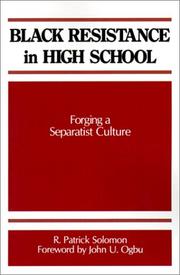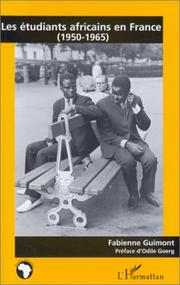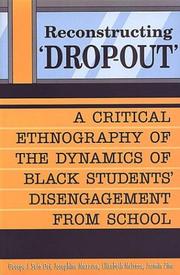| Listing 1 - 10 of 17 | << page >> |
Sort by
|

ISBN: 058509067X 9780585090672 0791408477 0791408485 1438420668 Year: 1992 Publisher: Albany State University of New York Press
Abstract | Keywords | Export | Availability | Bookmark
 Loading...
Loading...Choose an application
- Reference Manager
- EndNote
- RefWorks (Direct export to RefWorks)
This book investigates and brings into focus the formidable issues of racial culture left undeveloped in research on multiracial school populations in the United States, Britain, and Canada. Through ethnographic research, the author presents significant and provocative insight into the formation of black self-concept, and captures the complex interplay between black students' accommodation to the official achievement ideology and their resistance to the powerful structural forces operating within the school. It offers practical suggestions for working constructively with racial and ethnic sub-cultures as well as offering suggestions to school districts in the process of planning or implementing race and ethnic relations policies.
Students, Black --- West Indians --- Education --- Social Sciences --- Education, Special Topics --- Black students --- Negro students --- Blacks --- Ethnology --- Social conditions --- Case studies. --- Black people
Book
ISBN: 1283198002 9956715700 9786613198006 9956715824 9956615099 9789956715824 9956558303 9789956558308 Year: 2009 Publisher: Mankon, Bamenda [Cameroon] [Ann Arbor, Mich.] Langaa Research & Pub. Distributed in N. America by Michigan State University Press
Abstract | Keywords | Export | Availability | Bookmark
 Loading...
Loading...Choose an application
- Reference Manager
- EndNote
- RefWorks (Direct export to RefWorks)
It is more than forty seven years ago that the Federation of black African students in France (FEANF) organised its first seminar in Paris on the relationship between black African literature and politics. The significance of the event came from the fact that literature served as a vehicle for unmasking traitors in Africa. This was also an opportunity for African students to define the role of literature in political struggles and to appreciate correctly and objectively the commitments of African writers in French. At no time was it a question of over emphasising the importance of this type of
Students, Black --- Politics and literature --- African literature (French) --- Black students --- Negro students --- Blacks --- Literature --- Literature and politics --- French literature --- Political activity --- History --- History and criticism --- Education --- Political aspects --- African authors --- Black people
Book
ISBN: 1351255835 1351255827 Year: 2018 Publisher: Taylor & Francis
Abstract | Keywords | Export | Availability | Bookmark
 Loading...
Loading...Choose an application
- Reference Manager
- EndNote
- RefWorks (Direct export to RefWorks)
Advocating for the use of culturally specific pedagogy to enhance the mathematics instruction of diverse students, this revised second edition offers a wide variety of conceptual and curricular resources for teaching mathematics in a way that combats and confronts the forms of oppression that students face today. Addressing stratification based on race, class, and gender, Leonard offers lesson templates that teachers can use with ethnically and culturally diverse students and makes the link between research and practice. Connecting cutting-edge and emerging technologies to culturally specific pedagogy, the second edition features new chapters on mathematics and social justice, robotics, and spatial visualization. Applying a more expansive focus, the new edition discusses current movements such as Black Lives Matter and incorporates examples of rural and tribal students to paint a broader picture of what culturally rich mathematics classrooms actually look like. The text builds on sociocultural theory and research on culture and mathematics cognition to extend the literature and better understand minority students’ goals and learning needs. Including new discussion questions and new examples, lessons, and vignettes of integrating culture in the mathematics classroom, this book employs pedagogical research to field-test new instructional methods for culturally diverse and female students.
Mathematics-Study and teaching-United States-Social aspects.. --- Multicultural education-United States.. --- Minorities-Education-United States.. --- Critical pedagogy-United States. --- african american students --- black lives matter --- black students --- blm --- cognition --- computational thinking --- computer scaffolding --- critical race theory --- crt --- culturally diverse students --- culture --- cultural --- funds of knowledge --- game design --- linguistically diverse students --- math --- mathematics education --- maths --- native american students --- place --- rural students --- spatial visualization --- stem education --- african american students --- black lives matter --- black students --- blm --- cognition --- computational thinking --- computer scaffolding --- critical race theory --- crt --- culturally diverse students --- culture --- cultural --- funds of knowledge --- game design --- linguistically diverse students --- math --- mathematics education --- maths --- native american students --- place --- rural students --- spatial visualization --- stem education

ISBN: 273846288X Year: 1997 Publisher: Paris : Editions L'Harmattan,
Abstract | Keywords | Export | Availability | Bookmark
 Loading...
Loading...Choose an application
- Reference Manager
- EndNote
- RefWorks (Direct export to RefWorks)
African students --- Foreign study --- Students, Black --- 378.18 <6> --- 378.4 <44> --- 378.4 <44> Universiteiten--Frankrijk --- Universiteiten--Frankrijk --- Black students --- Negro students --- Blacks --- International study --- Study abroad --- Studying abroad --- Education --- Students, Foreign --- Students --- Social aspects --- Studenten: statuut. Maatschappelijke problemen van studenten--Afrika --- Black people

ISBN: 128202566X 1442679077 9786612025662 9781442679078 080204199X 9780802041999 080208060X 9780802080608 Year: 1997 Publisher: Toronto
Abstract | Keywords | Export | Availability | Bookmark
 Loading...
Loading...Choose an application
- Reference Manager
- EndNote
- RefWorks (Direct export to RefWorks)
"Based on a three-year study in the greater Toronto area, Reconstructing 'Drop-out' establishes a new frame of reference for understanding the drop-out dilemma. It is a call for social action and transformation that should not be ignored by researchers, teachers, administrators, and the Black community at large."--Jacket
Dropouts --- Students, Black --- Blacks --- Negroes --- Ethnology --- Black students --- Negro students --- Drop-outs --- Early school leavers --- School dropouts --- Students --- Youth --- Education --- Black persons --- Black people --- Ontario. --- Andalüe --- Andalüe Sheng --- Antarya --- Canada West --- Ontarėj --- Ontarijas --- Ontario-sh --- Ontariu --- Onṭaryo --- Onṭeryo --- Upper Canada
Book
ISBN: 1317448510 1317448502 1315696991 1138903299 0367894742 Year: 2018 Publisher: Taylor & Francis
Abstract | Keywords | Export | Availability | Bookmark
 Loading...
Loading...Choose an application
- Reference Manager
- EndNote
- RefWorks (Direct export to RefWorks)
This volume follows eleven Black male teachers from an urban, predominantly Black school district to reveal a complex set of identity politics and power dynamics that complicate these teachers’ relationships with students and fellow educators. It provides new and important insights into what it means to be a Black male teacher and suggests strategies for school districts, teacher preparation programs, researchers and other stakeholders to rethink why and how we recruit and train Black male teachers for urban K-12 classrooms.
Masculinity. --- Education, Urban. --- Male teachers. --- Masculinity (Psychology) --- Sex (Psychology) --- Men --- Men teachers --- Teachers --- Inner city education --- Urban education --- Cities and towns --- Urban policy --- Black education --- Black Identity --- Black Queer Male Teachers --- Black students --- Critical Black Masculinity Studies --- educational foundations --- educational leadership --- Father Figures --- gender and education --- heteronormativity --- masculinity studies --- Patriarchy --- teacher preparation programs
Book

ISBN: 1978827334 1978827342 9781978827332 1978827318 9781978827318 1978827326 9781978827325 Year: 2021 Publisher: New Brunswick : Rutgers University Press,
Abstract | Keywords | Export | Availability | Bookmark
 Loading...
Loading...Choose an application
- Reference Manager
- EndNote
- RefWorks (Direct export to RefWorks)
The 250th anniversary of the founding of Rutgers University is a perfect moment for the Rutgers community to reconcile its past, and acknowledge its role in the enslavement and debasement of African Americans and the disfranchisement and elimination of Native American people and culture. Scarlet and Black, Volume Three, concludes this groundbreaking documentation of the history of Rutgers’s connection to slavery, which was neither casual nor accidental—nor unusual. Like most early American colleges, Rutgers depended on slaves to build its campuses and serve its students and faculty; it depended on the sale of black people to fund its very existence. This final of three volumes concludes the work of the Committee on Enslaved and Disenfranchised Population in Rutgers History. This latest volume includes essays about Black and Puerto Rican students' experiences; the development of the Black Unity League; the Conklin Hall takeover; the divestment movement against South African apartheid; anti-racism struggles during the 1990s; and the Don Imus controversy and the 2007 Scarlet Knights women's basketball team. To learn more about the work of the Committee on Enslaved and Disenfranchised Population in Rutgers History, visit the project's website at http://scarletandblack.rutgers.edu.
Black Lives Matter, BLM, Rutgers, Rutgers University, Rutgers diversity, black students, African American, New Brunswick, Douglass College, Paul Robeson, Race at Rutgers, Scarlet and Black, Scarlet Knights, Douglass Woman, race relations, student activism, contemporary history, black power, student organizations, black student union. --- HISTORY / General.
Book
ISBN: 1134297548 1281158585 9786611158583 0203462963 9780203462966 9780415340564 Year: 2005 Publisher: London New York Routledge
Abstract | Keywords | Export | Availability | Bookmark
 Loading...
Loading...Choose an application
- Reference Manager
- EndNote
- RefWorks (Direct export to RefWorks)
Drawing on her extensive teaching experience, Lorna Cork explores the day-to-day needs and expectations of black parents and their children in education. Exclusion rates of black children in the UK and around the world continue to rise, highlighting that something is very wrong with the way their teaching and learning is supported in today’s schools. Focusing on contemporary situations and using real-life case studies, Cork emphasises the human consequences of the true issues behind the statistics.This topical text offers a detailed look at five key organisations that exist to support black parents. It examines their home-school interventions and discusses the central issues arising out of their efforts. The fascinating evidence offers fresh perspectives and provides much needed advice and guidance to all those seeking to improve co-operation between black families, schools and communities - all who share the goal of supporting the learning and attainment of the black child.Any education professional, student teacher, staff at an LEA, and anyone with a serious interest in race issues is sure to find this essential reading.
Students, Black --- Home and school. --- Discrimination in education. --- Parent-teacher relationships. --- Parent and teacher --- Parents and teachers --- Teacher and parent --- Teacher-parent relationships --- Teachers and parents --- Interpersonal relations --- Home and school --- Educational discrimination --- Race discrimination in education --- Education --- Affirmative action programs in education --- Segregation in education --- School and home --- Parent-teacher relationships --- Parents' and teachers' associations --- Black students --- Negro students --- Blacks --- Social conditions. --- Black people
Book

ISBN: 1978813031 1978813058 1978816332 1978813023 9781978813021 9781978813038 9781978813052 Year: 2020 Publisher: New Brunswick, NJ : Rutgers University Press,
Abstract | Keywords | Export | Availability | Bookmark
 Loading...
Loading...Choose an application
- Reference Manager
- EndNote
- RefWorks (Direct export to RefWorks)
The 250th anniversary of the founding of Rutgers University is a perfect moment for the Rutgers community to reconcile its past, and acknowledge its role in the enslavement and debasement of African Americans and the disfranchisement and elimination of Native American people and culture. Scarlet and Black, Volume 2, continues to document the history of Rutgers’s connection to slavery, which was neither casual nor accidental—nor unusual. Like most early American colleges, Rutgers depended on slaves to build its campuses and serve its students and faculty; it depended on the sale of black people to fund its very existence. This second of a planned three volumes continues the work of the Committee on Enslaved and Disenfranchised Population in Rutgers History. This latest volume includes: an introduction to the period studied (from the end of the Civil War through WWII) by Deborah Gray White; a study of the first black students at Rutgers and New Brunswick Theological Seminary; an analysis of African-American life in the City of New Brunswick during the period; and profiles of the earliest black women to matriculate at Douglass College. To learn more about the work of the Committee on Enslaved and Disenfranchised Population in Rutgers History, visit the project's website at http://scarletandblack.rutgers.edu
HISTORY / General. --- Rutgers University --- Rutgers University, New Brunswick, N.J. --- Rutgers--the State University --- State University of New Jersey --- Rutgers State University of New Jersey --- University of Newark --- Rutgers College --- History. --- Rutgers University, enslavement, debasement, African American, disfranchisement, Native American, slavery, college, university, campus, Committee on Enslaved and Disenfranchised Population in Rutgers History, Civil War, World War II, New Brunswick Theological Seminary, New Brunswick, New Jersey, Douglass College, black women, black students.
Book
ISBN: 1978822561 1978822529 1978822537 9781978822566 Year: 2022 Publisher: New Brunswick
Abstract | Keywords | Export | Availability | Bookmark
 Loading...
Loading...Choose an application
- Reference Manager
- EndNote
- RefWorks (Direct export to RefWorks)
Protests against racial injustice and anti-Blackness have swept across elite colleges and universities in recent years, exposing systemic racism and raising questions about what it means for Black students to belong at these institutions. In Black Space, Sherry L. Deckman takes us into the lives of the members of the Kuumba Singers, a Black student organization at Harvard with racially diverse members, and a self-proclaimed safe space for anyone but particularly Black students. Uniquely focusing on Black students in an elite space where they are the majority, Deckman provides a case study in how colleges and universities might reimagine safe spaces. Through rich description and sharing moments in students’ everyday lives, Deckman demonstrates the possibilities and challenges Black students face as they navigate campus culture and the refuge they find in this organization. This work illuminates ways administrators, faculty, student affairs staff, and indeed, students themselves, might productively address issues of difference and anti-Blackness for the purpose of fostering critically inclusive campus environments.
African American college students --- African Americans --- Education (Higher) --- Social aspects. --- Kuumba Singers. --- Harvard University --- Students. --- white, whiteness, black, african american, blackness, american indian, native american, asian, asian american, american, identity, nationalism, national identity, ethnicity, race, non-white, racial identity, minority, racial studies, people of color, mixed race, diversity, education, African Americans, ethnic studies, art, music, architecture, racial injustice, anti-blackness, elite, higher education, black students, Harvard, campus culture, inclusivity, systemic racism, uplifting, support.
| Listing 1 - 10 of 17 | << page >> |
Sort by
|

 Search
Search Feedback
Feedback About UniCat
About UniCat  Help
Help News
News